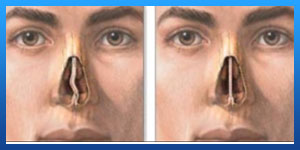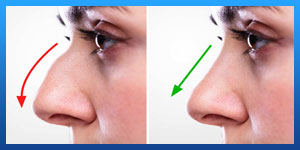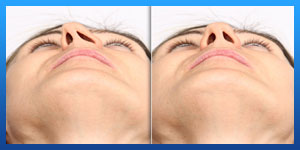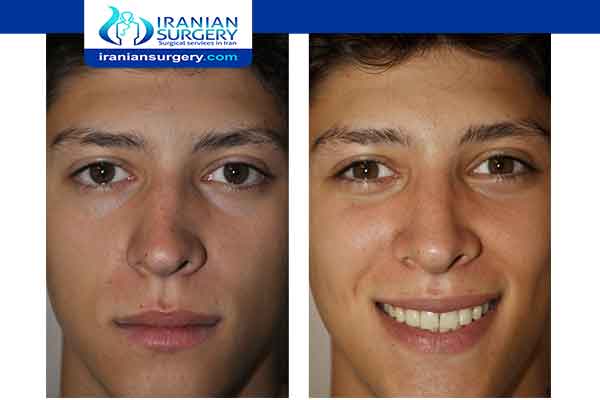What happens after deviated septum surgery (septoplasty)?
After deviated septum surgery, the patient will be taken to the recovery room where a nurse will monitor the patient. They will be able to go home the same day as the surgery once fully recovered from the anesthetic. This usually takes several hours. The patient will need a friend or family member to pick them up from the surgical facility and take them home. It may be necessary for the family member or friend to spend the first night with the patient after surgery for assistance.
When patients arrive home from the surgical facility, they should go to bed and rest with their head elevated on two to three pillows. By keeping the head elevated above the heart they can minimize fluid accumulation in the tissues (edema) and swelling. They may get out of bed with assistance to use the bathroom. Patients should avoid straining while urinating or passing stool. If constipated they should take a stool softener or a gentle laxative.

Read more about : Pros and cons of deviated septum surgery
Read more about : How to fix a deviated septum without surgery?
Read more about : Open rhinoplasty Vs closed Rhinoplasty by Dr.Maryam Mosleh
Read more about : Rhinoplasty vs Septoplasty
Patients may have some swelling of the nose, upper lip, cheeks, or around the eyes for several days after surgery. This swelling will gradually resolve and is normal. They can help reduce the swelling by putting ice on the face, bridge of the nose, and eyes as much as tolerated. This will also help with postoperative edema and pain. Some patients have found frozen vegetable in packages (for example bags of frozen peas) to be a convenient ice pack which is more likely to conform to the face.
Moderate bleeding from the nose is normal, and will gradually decrease. The gauze dressing (“mustache dressing”) will collect blood and should be changed only when saturated. It is not unusual to change these dressings every hour during the first 24 hours after surgery. After a few days, patients will usually no longer need to use the dressing. Patients should not take aspirin, aspirin-containing medications, or nonsteroidal anti-inflammatory medications (NSAIDs) such as ibuprofen or naproxen for three weeks following surgery.

It is best for patients to eat a light, soft, and cool diet as tolerated once recovered fully from the anesthetic. Hot liquids should be avoided for several days. Even though the individual may be hungry immediately after surgery, it is best to proceed slowly with food intake to prevent postoperative nausea and vomiting. Occasionally, the person may vomit one or two times immediately after surgery; if vomiting persists, the doctor can prescribe medication to settle the stomach. It is important to remember that a good overall diet with ample rest promotes healing.
Patients will be prescribed antibiotics after surgery, and should finish all the pills that have been prescribed. Some form of a narcotic may also be prescribed and is to be taken as needed. If patients require narcotics, they are cautioned not to drive. In some situations, the doctor may prescribe steroids to reduce inflammation either preoperatively and/or postoperatively. It is very important that patients take this medication as prescribed, and not discontinue it prematurely. If patients have nausea or vomiting postoperatively, they may be prescribed anti-nausea medications (antiemetics). If patients have any questions or they feel they are developing a reaction to any of these medications, they should consult their doctor. Patients should not take any other medication, either prescribed or over-the-counter, unless they have discussed the medications with the doctor.
Read more about : Rhinoplasty in Iran Review
General instructions and follow-up care for deviated septum surgery (septoplasty)
In most situations, packs will have been placed in the nose to control bleeding; often times a septal splint is placed that will be removed by the surgeon at the first post-operative visit. The doctor will let the patient know when they are to return to the office to have these packs removed. Patients may need to call the office to schedule this postoperative appointment and should arrange for someone to drive them to and from the office for this first visit. They should eat a light meal before going, and avoid taking excessive pain medications. They may also have several subsequent office visits to assess healing, remove crusts (debris) that may accumulate at the surgical site, especially if combined with sinus surgery. Such visits help insure a speedy recovery. The nose will probably be tender after surgery, so the doctor will spray it with a special numbing medication before removing crusts.
After the packing has been removed, patients may breathe through the nose, but are not to blow or sneeze through the nose for 7 to 10 days. If the person must sneeze, they should open their mouth. Patients can expect some light blood-tinged drainage from the nose for several days. If bleeding becomes excessive, apply ice and rest quietly with head elevated while holding the nose. If bleeding continues, they should call the surgeon’s office for advice.

One of the most important things patients can do after surgery is nasal irrigation (rinsing). Immediately after the nasal packs are removed they should use a saline nasal spray such as “Ocean Spray” several times per day to prevent crusts from forming in their nose. Patients are to continue using irrigation until the doctor tells them to stop. Many patients will use irrigations (for example, neti-pots) indefinitely or when they have an upper respiratory infection. Failure to irrigate especially as instructed after surgery will likely cause the surgery to fail.
Patients may go back to work or school only when the doctor indicates it is safe to return. They should rest for the first week following surgery. They must also avoid excessive talking, smiling, chewing hard foods, strenuous activities, bumping their nose, bending over, and lifting heavy objects. They should not rest glasses on the bridge of the nose until soreness and swelling subsides. They may wear contact lenses once eye swelling and any irritation has resolved. Alcohol and tobacco products should be avoided because they may prolong swelling and healing. Smoke, dust, and fumes may irritate the nose and cause an infection. Facial tanning is discouraged for six months after surgery. If patients must be in the sun they should use a number 15 or greater sun block. Patients may use their usual make-up any time after surgery.
Patients should lubricate the nostrils, as instructed with a Q-tip and Vaseline to soften crusts that are hard and firmly attached to healing tissue. Peroxide helps to loosen crusts. After several days they may notice a few of the absorbable sutures and should not try to disturb or remove them. They must be gentle while brushing the upper teeth. These teeth will often be tender for several weeks, and there may be some numbness of the teeth and palate for several months.
After three weeks if patients are not having problems with bleeding, they may resume exercise and swimming, but no diving for two months. They should plan to stay in town and not travel for three weeks to allow for postoperative care and in case bleeding occurs.
When to call the doctor after septoplasty
Patients should notify the doctor if they have:
. A sudden increase in the amount of bleeding from the nose unrelieved by pressure, ice, and head elevation.
. A fever greater than 101.5 F (38.6 C) that persists despite increasing the amount of fluid and acetaminophen (Tylenol). A person with a fever should try to drink approximately one cup of fluid each waking hour.
. Persistent sharp pain or headache which is not relieved by the pain medication prescribed.
. Increased swelling or redness of the nose or eyes.
Most surgeons want to know about complications or problems that develop with their patients, so do not hesitate to call the surgeon to inform them and ask questions about any problems you are experiencing.
Lifestyle tips
As the nose heals, people can avoid the following to ease recovery:
. For at least 7–10 days, blowing the nose
. Drinking alcohol
. Smoking tobacco
. Returning to work too soon
. Crowds, especially in areas where people are more likely to encounter cigarette smoke and other individuals with colds or coughs, increasing the chances of getting sick.
About Iranian Surgery
Iranian surgery is an online medical tourism platform where you can find the best Septoplasty Surgeons in Iran. The price of a Septoplasty in Iran can vary according to each individual’s case and will be determined based on photos and an in-person assessment with the doctor.
For more information about the cost of Septoplasty in Iran and to schedule an appointment in advance, you can contact Iranian Surgery consultants via WhatsApp number +98 901 929 0946. This service is completely free.


14 Responses
I’am 72 yrs. old and was told that I had a deviated septum, but was not pushy about having the surgery. I get sinus infections periodically and my breathing is good , but not as good as it could be . I apparently have had this since my childhood, but when he told me that I would probably sleep better and that I would have fewer infections. Not sure if I should have the surgery , because of my age, any suggestions would be helpful.
Hi. This is dr mosleh, otolaryngologist, head and neck surgeon.
It is better to see you CT scan befor definit answer, but, age is not a contraindication in this surgery if you have healthy body.
But deviated septum can cause problem in sleeping, snoring and sinus infection. And by correcting that, these can resolve eventually.
Please send your PNS CTscan for more accurate answer.
hi doc. my younger sister had a septoplasty surgery 4 days ago and she has started smoking again. would smoking effect her recovery?
hey Friend. hope you are good. you should know Active smoking status does not affect operation outcomes and does not increase the postoperative complication rate among patients undergoing septoplasty. Although we should advise our patients to stop smoking because of its known harmful effects, smoking may not be a selection criterion for septoplasty.
Hello Doc, I just had Septoplasty surgery after learning I had a deviated septum and excess tissue on my left nostril. I do have mild sleep apnea and was wondering if this may help alleviate the apnea’s. I notice that when I don’t sleep with my CPAP I have very heavy short breathing. Thank you!
hello there. you need to have a consult with our agents and later with a specialist
for more information please send a message on what’s app to this number +989019290946
hi.Can a person do Septoplasty twice?
Yes, it is possible because the patient might expiriance the continuation of the symptoms after the first surgery.
Hi Dr, my 4years son mistakly beat me with his hand on the nose 4days after septoplasty. Would tht be a problem?
Dear ….
If there is no pain, your breathing is normal, and there is no bruise or swelling you don’t have to be worried.
After rhinoplasty and septoplasty, your nose should be protected with a cast for 7 days.
After removing the cast for one month you should avoid sleeping on your face and extreme activities.
During this recovery time, if you experience pain, bleeding, and breathing problems consult with your surgeon.
Hi accidentally lowered my head below my heart after septoplasty. The feeling in my nose feels tight but the breathing doesn’t seem to be restricted would the rush of blood to that area cause a problem it was only for a minute or so I had surgery one we could go today And had my nose packs taken out this last Friday
Dear Ron
This matter can not be seen into online, you should be visited by a Specialist.
Thank you For your E-mail
If I do Septorinoplaty in Iran, how long will it take to recover and get better so that I can be ready for my return trip?
Septorhinoplasty, like any other nose surgery, requires a recovery period of one week to ten days. During this period, the swelling of your nose is severe, and you may (depending on the type of septum) have pain, which is relieved by painkillers and the use of ice. Our surgeons will monitor you for up to 72 hours after the surgery, and after that, you should keep your nasal cast and be careful of accidental blows to the nose. After 10 days, in the third meeting with the surgeon, your cast will be removed, you will be examined again to determine the result of the operation, your stitches will be taken out, and you will be prepared for the flight and return with the doctor’s approval. We will continue to be in touch with you after you get home. Between one and two months, you should take good care of your nose and adjust your sleeping position according to the doctor’s instructions.